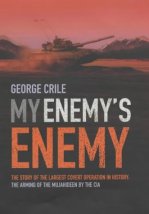
My Enemy's Enemy
George Crile
550 pages, including index
published in 2003
This is the story of how one US congressman managed to create the USSR's own version of Vietnam: Afghanistan and how one particular CIA agent helped him to do so. The backcover blurb by Dan Rather compares My Enemy's Enemy with Tom Clancy's fiction and that is not just idle praise. This is indeed an incredible, alarming story.
It all started with the 1979 invasion of Afghanistan by the Soviet Union, who wanted to help a friendly government threatened by insurrection. The President Carter and the CIA both saw this as a chance to do to the Soviets what they had done to the US in Vietnam, though both Carter and the CIA were very careful in how far they went. The result was that the continuing resistance to the Soviet presence remained nothing more than a nuisance.
Enter Charles Wilson. Charles Wilson was a liberal, Democratic Party congressman from deep in the conservative heart of Texas, who kept getting reelected because he treated his constituents well; he kept bringing in the pork. This also made him loved with his fellow congresspeople, both Democratic and Republican as he could always be counted upon to help you get some pork. Outside Congress, he mainly had the reputation of being a party boy, a drunk and a coke head.
And yet, he was the right man in the right place when the Muhajedin came asking for help against the USSR. He singlehandedly forced the CIA to step up their Afghanistan programs. In the end, the Muhajedin got $10 billion a year in arms and other goods and were equipped with some of the most modern weapons the US could deliver, including the invaluable Stinger missiles, with which they could finally blast the dreaded Russian gunships out of the sky. It was an incredibly well organised and managed operation, which more then succeeded in its goals and in the end the Soviets had to leave Afghanistan as ignobly as the Americans had had to leave Vietnam. And this at the same time that Ollie North and similar loonies were dicking around with illconcieved contra operations in Nicaragua. Not to mention the Iran-Contra scandal.
Wilson did not achieve this on his own. Just as important was the support of senior CIA official Gust Avrakotos, a diehard anti-communist who previously had been a great help to the fascists colonels of Greece when they took power in 1967. Avrakotos fought inside the CIA for grreater efforts to aid the Muhajedin, as he saw Afghanistan as the ideal place to bleed the Soviets dry. He and Wilson took an immediate liking to each other: "what brought [me and Wilson] together was chasing pussy and killing Communists, so Avrakotos boasted.
A nice bonus, for those of us not overtly impressed by the current US administration and its ideological allies' compentence, is the cameo appearance by Richard "clown prince of darkness" Perle. Perle is seen pushing a typically unworkable plan to help Soviet soldiers defect to the Muhajedin, which according to him would result in an army of Soviet defectors helping the Afghanistan resistance. Avrakotos in particular heaps scorn on this plan: any likely defactor will be raped within an inch of his life by the Muhajedin and afterwards will die a slow and agonising death.
The book ends with the triumph of the Mujahideen, with the epilogue looking at what happened after that triumph. US support for the Afghanistan resistance helped create a new international movement of militant Islamitic warriors, convinced that Allah let them drive the Russians out of Aghanistan and now Allah will let them defeat that other superpower. I was disappointed that not more attention was paid to this aspect. On the whole the author wasn't very critical of the US actions in Afghanistan; the question if what the US was doing there was right or not never arose.
This is also where the Tom Clancy comperison is most apt. As in his fiction, American might makes right here. The author, George Crile never questions the morality of Wilson and Avrakotos or of their actions. Both are shown to admire some of the more unsavoury figures the US supported. Wilson tried to help the Nicaraguan dictator Somoza and Avrakotos as said supported the Greek colonels and even suggested assassinating future Greek prime minister Andreas Papandreou.
In general, what you have hear is a book in which the realities of the Afghan War are largely irrelevant and treated as such. The focus is all on Washington and CIA powergames, not the reality on the ground for e.g. a Soviet conscript or a Muhajedin volunteer. It reads as a boy's adventure, but ignores the real horrors of what the US helped create in Afghanistan.
